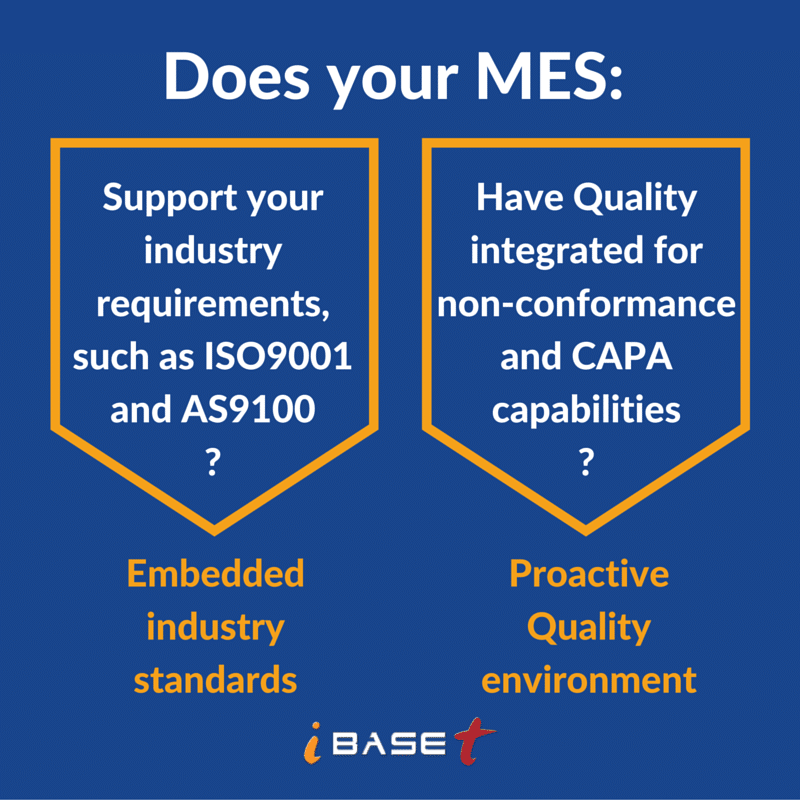 Over the past few years, customers across all industries have demanded higher quality from manufacturers. Couple that with the evolving quality standards and your company’s task to uphold quality products becomes an ongoing challenge. Manufacturers, especially those who fall into the complex discrete industries (Aerospace & Defense, Nuclear, Industrial Equipment, and Medical Devices) have responded to this challenge by placing a higher emphasis on achieving consistent quality results by implementing a Manufacturing Execution System (MES) with integrated quality functions for real-time visibility.
Over the past few years, customers across all industries have demanded higher quality from manufacturers. Couple that with the evolving quality standards and your company’s task to uphold quality products becomes an ongoing challenge. Manufacturers, especially those who fall into the complex discrete industries (Aerospace & Defense, Nuclear, Industrial Equipment, and Medical Devices) have responded to this challenge by placing a higher emphasis on achieving consistent quality results by implementing a Manufacturing Execution System (MES) with integrated quality functions for real-time visibility.
MES with integrated quality functions provides quality management to drill down into problem areas for noting non-conformance and real-time corrective actions. We’ve identified two quality-specific questions you should ask your Manufacturing Execution System vendors before implementation.
Does this Manufacturing Execution System (MES) support my industry requirements?
Quality tells the outside world what you really stand for as a manufacturer, solidifying your reputation for years to come. Periodic changes to hallmark standards, such as ISO 9001 and AS 9100, provide a critical opportunity to reexamine your quality management process and raise total quality to the next level.
When it comes to implementing and maintaining a sound quality management process, the devil is in the details of the standards. Ensuring the MES solution you decide to acquire is compliant with requirements found in ISO9001, AS9100, ISO13485, FDA Title 21 CFR Part 820 standards and others relevant to your industry is critical for the success of the implementation. When MES solutions are built with industry standards embedded into it, you are ensuring that each step is meeting its requirements before going to the next set of work instructions. It is also extremely helpful if the MES vendor has prior experiences in your industry and already knows where your pains are.
Is Quality integrated within this Manufacturing Execution System (MES)?
Integrating Quality Control with electronic work instructions ensures total incorporation of your quality processes, including non-conformances and Corrective and Preventative Actions (CAPA). Having a disparate quality system works too if your only objective or requirement is to capture your discrepancies, but it is very time consuming and often times not communicated well throughout the organization. By integrating Quality functions into your MES, you have real time visibility into quality and eliminate the time entering redundant data and logging in-and-out of disparate systems. When an operator/technician on the shop floor encounters a discrepancy, they are able to initiate the non-conformance within the electronic work instruction, simply by stating what happened or what went wrong within the same single glass view on the shop floor, without having to log in-and-out of multiple systems or enter redundant data that is already noted in your MES. And from there, corrective actions can be created and executed in real-time. The ability to have these Corrective and Preventative Action (CAPA) functions within MES is especially beneficial in complex discrete manufacturing environments where unplanned events, discrepancies and engineering changes can and do occur often. An MES with integrated Quality functions not only saves everyone’s time, but also promotes a Proactive versus Reactive quality environment, that can actually drive down your cost of quality.
